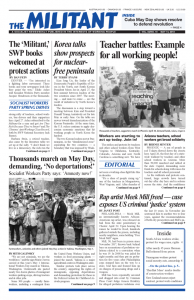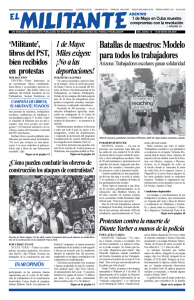In a victory for political rights, former Black Panther Herman Bell was released from Shawangunk Correctional Facility in Wallkill, New York, April 27 after spending nearly 45 years behind bars.
Bell was freed despite furious opposition and a media blitz by the Patrolmen’s Benevolent Association. The cop association went to court to prevent his release, but State Supreme Court Judge Richard Koweek ruled against them. The parole board decision “was not irrational,” he said. “Nor did it border on impropriety. Therefore, it must be upheld.”
The cops vowed to continue efforts to have him thrown back behind bars. A full panel of appellate judges May 4 will hear another motion filed by the PBA.
The issue has been played up big in the media since March 13 when Bell was granted parole at his eighth hearing before the board.
Bell, 70, was convicted in 1973, along with Albert Washington and Jalil Muntaqim (born Anthony Bottom), in the 1971 killing of two New York City police officers. They each got a sentence of 25 years to life. Washington died in prison in 2000. Muntaqim is scheduled to appear before the parole board in June.
During Bell’s decades in prison he served as a mentor for young prisoners, the FreeHermanBell.org website says, on issues “including Black History, English grammar and writing skills” so they could “claim the pride, dignity and responsibility that comes with their knowledge.” While in prison he earned bachelor’s degrees in psychology and sociology and a master’s in sociology.
In the days before Bell’s release, the PBA claimed 367,000 online letters had flooded the parole board opposing his release, trying to make their moves against him look like a popular groundswell. This was played up in an editorial in the New York Post attacking Bell and by the Daily News.
But it turns out “the huge number of letters was automatically generated by fewer than 6,000 individual complaints made via the NYC PBA website,” reported Intercept, an online news site. “A spokesperson for the NYC PBA confirmed that.”
Several politicians backed the PBA campaign. New York Mayor Bill de Blasio wrote the parole board to urge them to reverse its decision. Gov. Andrew Cuomo told the media that he opposed granting Bell freedom.
Support for Bell’s release included the son of one of the slain cops, whose letter to the parole board helped impact its decision.
Bell walked out of the prison shortly after 5 p.m. and returned to Brooklyn.

